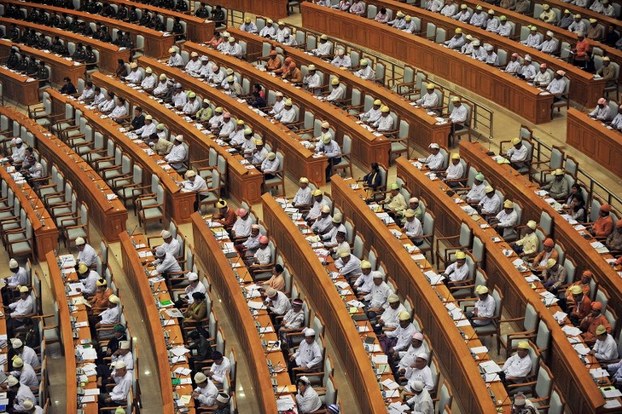Myanmar speaker sets charter change priority in new parliament session
| Publisher | Radio Free Asia |
| Publication Date | 11 September 2014 |
| Cite as | Radio Free Asia, Myanmar speaker sets charter change priority in new parliament session, 11 September 2014, available at: https://www.refworld.org/docid/5420352210.html [accessed 1 June 2023] |
| Disclaimer | This is not a UNHCR publication. UNHCR is not responsible for, nor does it necessarily endorse, its content. Any views expressed are solely those of the author or publisher and do not necessarily reflect those of UNHCR, the United Nations or its Member States. |
2014-09-11
 Lawmakers attend a parliamentary session in Naypyidaw, Aug. 16, 2013. AFP
Lawmakers attend a parliamentary session in Naypyidaw, Aug. 16, 2013. AFP
Myanmar parliamentary speaker Shwe Mann on Thursday stressed the urgency of considering constitutional amendments as the country's legislature began a new session, calling on lawmakers to work together to further democratic reform in the nation.
"We can say that the current environment is the most democratic we've seen in Myanmar in 50 years, but we still have not attained the system that the people expected and haven't reformed as much as the people would have liked," Shwe Mann said at the opening of the latest parliamentary session in the capital Naypyidaw.
"We must continue to work towards what the people want by maintaining the current good climate [in parliament] and working with one another through goodwill. We really need each other's opinions, thorough thinking, and definitive actions to support the process of national reconciliation."
He said that among issues to be debated in the current session is the electoral system to be used in general elections in 2015 amid studies by a panel on a controversial proportional representation (PR) system, in which the number of seats won by a party is proportional to the number of votes received.
Opposition leader Aung San Suu Kyi's party and ethnic parties are against the PR system.
Shwe Mann said the panel plans to present its findings to the legislature on Sept. 15.
The ruling Union Solidarity and Development Party (USDP) is pushing for the PR system in a bid to prevent a highly likely landslide win by Aung San Suu Kyi's National League for Democracy (NLD) in the 2015 general elections, some reports have suggested.
Article 436
Meanwhile, USDP MP Hla Swe told RFA's Myanmar Service Thursday that the current session will also likely include much debate over potential amendments to the 2008 military-drafted constitution, "as all representatives in parliament are enthusiastic to discuss this."
He said parliament could amend an article of the constitution which allows effective veto power by Myanmar's military over proposed constitutional changes.
"Article 436 could be amended, as authorities in parliament have said they would do it," Hla Swe said.
Article 436 effectively gives the military, which controls 25 percent of seats in parliament, a veto over constitutional amendments, since it requires more than 75 percent of parliamentary representatives to approve any change.
Aung San Suu Kyi has said that getting rid of the military's veto is the first step needed to pave the way for other amendments.
Last month, a petition by the NLD calling for a number of amendments to articles in the constitution it views as undemocratic garnered nearly five million signatures, but the USDP, which is largely comprised of former junta generals, has been slow to accept reforms to the charter.
Article 59
The NLD is also calling for amendments to Article 59(F), which prohibits Aung San Suu Kyi from becoming president because her two sons are not citizens of Myanmar.
But Hla Swe said Thursday that proposed changes to the article were likely to be met with stiff resistance in parliament.
"In my personal opinion, it is not possible to amend Article 59(F)," he said.
"If we amend that article, our country would become one that anybody could control. I don't think [lawmakers] would be willing to let that happen."
Hla Swe did not comment on another proposal to amend Article 59(D), which states that the president of Myanmar "shall be well acquainted with the affairs of the Union such as political, administrative, economic, and military."
The clause is widely interpreted to mean that the president would have had to have served in Myanmar's army, which Aung San Suu Kyi has not done.
The U.S. and other Western nations have lauded Myanmar's leadership for charging ahead with reforms since President Thein Sein's quasi-civilian government took power from the former junta in 2011, but have cautioned that more must be done to cement the country's status as a democracy.
In August, Shwe Mann met with U.S. Secretary of State John Kerry on the sidelines of the Association of Southeast Asian Nations (ASEAN) talks in Naypyidaw.
Kerry told the country's leaders to proceed with constitutional changes to ensure that elections set for next year are free, fair, and credible, the Associated Press reported.
Reported by Win Naung Toe and Zin Mar Win for RFA's Myanmar Service. Translated by Khet Mar. Written in English by Joshua Lipes.
